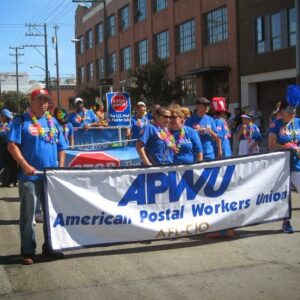March 1, 2014
A Safe Workplace: It’s Not a Matter of Luck
(This article appears in the May-June 2014 issue of The American Postal Worker magazine.)
Tony D. McKinnon Sr., Industrial Relations Director
Our members want to be assured that we will leave work each day as healthy as we were when we arrived.
And that’s not a matter of luck. It’s a contractual right: Article 14.1 of the Collective Bargaining Agreement, which governs Safety and Health, says, “It is the responsibility of management to provide safe working conditions in all present and future installations and to develop a safe working force. The Union will cooperate and assist management to live up to this responsibility.”
The Industrial Relations Department is responsible for administering the joint Safety and Health program with the USPS, and it is a top priority.
Outstanding Issue
An important outstanding issue involves electrical safety hazards. The Industrial Relations Department has been informed by some of our Regional Safety Representatives that the USPS has failed audits of electrical safety practices and is violating a settlement made last year with the APWU and the Department of Labor.
On June 28, 2013, the parties signed an unprecedented nationwide agreement that settled a series of OSHA complaints initiated by the APWU regarding violations of safe electrical work practices.
The agreement marked OSHA’s first “enterprise-wide” settlement and followed a four-year campaign by the APWU and OSHA (Occupational Safety and Health Administration) to force postal management to address egregious electrical safety hazards at postal facilities across the country. Over the course of the four-year campaign, the Postal Service accumulated millions of dollars in fines for continual non-compliance with OSHA’s electrical safety rules.
The 2013 agreement outlined the steps the USPS was required to make to avoid even greater fines. As a result of the settlement, the USPS completely revised its policies and procedures on electrical work.
The Industrial Relations Department has been discussing the implementation of the agreement with the help of our 14 experienced and knowledgeable Regional Safety and Health representatives.
Unfortunately, the USPS has refused to approve travel requests for our safety representatives, preferring to use local people for audits, in direct contrast to OSHA regulations, which state that audits should be conducted by people outside the area.
What’s next?
In addition to following up on the electrical safety issue, we’ve been working with management to establish a Standard Operating Procedure for USPS-APWU District Safety Committee Training. In March we completed a draft Participant Guide and hope to sign off on it soon. We hope it will be used to train Local Safety Committees.
Although the headquarters-level Joint APWU/USPS Safety Committee is required to meet at least once a quarter, the APWU is committed to meeting as often as necessary to resolve safety issues.
Ending the Grievance Backlog
There is a backlog of 30,000 arbitration cases nationally and that is just unacceptable. Members deserve to have their grievances resolved in a reasonable amount of time.
The Industrial Relations Department is committed to doing whatever we can to get that number down. We will be contacting local presidents to see if we can help them improve the grievance resolution rate at the local level and to gauge whether they are interested in testing modified grievance programs.
We also need good preparation of cases at the initial level – we cannot expect National Business Agents to make a Cinderella out of an ugly stepsister of a grievance.
Once we reduce the backlog, we intend to implement real change, not a band-aid. If we cannot change or work toward change, we must enforce Article 15.5.B.1.a of the Collective Bargaining Agreement, which says that arbitration hearings are to be scheduled and heard within 120 days following the receipt of the arbitration appeal.
Article 1.6B ‘Global Settlement’
The USPS is continuing efforts to undermine the “Global Settlement” of cases where managerial personnel performed bargaining unit work in excess of contractual limits in Level-18-and- below offices.
The Global Settlement, which is part of the 2010-2015 contract, stipulates that postmasters may perform up to 15 hours per week of bargaining unit work in Level 18 post offices and up to 25 hours in Level 15 and Level 16 offices. It also says, “All time the supervisor or Postmaster spends staffing the window during the day will be counted towards the permissible bargaining unit work limits.”
During negotiations, the union clearly stated that if the window is open for business, it is being staffed. If the person staffing the window is a postmaster, all time the window is open must count against the limits, regardless of other tasks the postmaster performs during that time.
After agreeing to the language in negotiations, the USPS took the position that what management intended was not “all time” staffing the window but rather time actually working the window.
The APWU appealed the dispute to arbitration and in March 2013 Arbitrator Shyam Das upheld the union’s position. That should have settled the issue.
However, the APWU and management were unable agree on a remedy for violations of the limits and returned to Arbitrator Das to settle the matter. At hearings in October 2013, the USPS argued against any retroactive monetary award, claiming that no actual contract violations had been established and asserting that any remedy should be applied only to violations that occurred after the March ruling.
Arbitrator Das again rejected management’s position and instructed the Postal Service to provide the APWU with documentation requested by the union within 90 days.
As the 90-day deadline approached, the USPS sent the APWU thousands of pages of documentation. Unfortunately, the information did not accurately reflect the hours worked by postmasters and supervisors, and some weeks covered by the arbitration decision were excluded.
On March 26, 2014, Clerk Craft Director Clint Burleson, Assistant Director Lamont Brooks and I met with management to review the documentation, ascertain how management developed the figures, verify their accuracy, calculate appropriate monetary remedies, and discuss additional documentation we felt was necessary to resolve the issue.
Arbitrator Das has retained jurisdiction and, in the event the parties cannot resolve the case, a date will be secured with the arbitrator in July.


